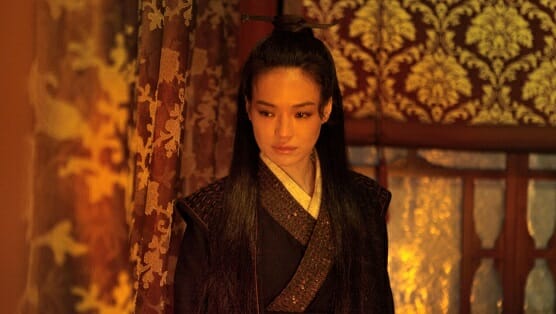The Assassin (2015 Cannes review)

Hou Hsiao-Hsien’s The Assassin is a gorgeous creation, a martial arts movie that willfully withholds and subverts the primary pleasures of the genre to get at something more beautiful, mysterious and timeless. One doesn’t watch The Assassin so much as fall under its sway. It’s such an ambitious, visually stunning piece of cinema that I half assume it’s my own failing that I didn’t wholly succumb to its wonders.
The Taiwanese director’s first film since 2007’s Flight of the Red Balloon, The Assassin takes us back to ninth-century China as the Tang dynasty is beginning to unravel. Shu Qi plays Nie Yinniang, whom (we learn in an opening crawl) was abducted by a nun when she was only 10 and trained in martial arts. Years later, Nie has been ordered to return to her homeland to assassinate Tian (Chang Chen), a warlord to whom she had been promised in marriage as a child.
The Assassin’s story is somewhat simplistic but, as depicted by Hou, also incredibly complicated, with scenes of throne-room intrigue littering the film’s first half. If the plot machinations are hard to follow, frequent Hou cinematographer Mark Lee Ping Bing makes it all look arresting. With scenes often taking place indoors at night, The Assassin can feel almost dreamlike, an impression heightened by the fact that the filmmaker often places in between his camera and the actors thin, billowing curtains, which create the sensation that we’re watching half-remembered incidents or eavesdropping on top-secret meetings.
Into Tian’s world comes Nie, who is a woman of very few words. Often hiding in the shadows, she listens in on conversations about this flailing empire, her unseen presence almost a ghost haunting Tian and his companions. The martial arts film has similarities to the Western, and The Assassin could be seen in some ways as Hou’s version of an Unforgiven, in which narrative tenets and character types are in service to a higher purpose, a more audacious form of art. The violence isn’t the point of The Assassin: The words and action that lead to violence are.
-

-

-

-

-

-

-

-

-

-

-

-

-

-

-

-

-

-

-

-

-

-

-

-

-

-

-

-

-

-

-

-

-

-

-

-

-

-

-

-








































